3.2 Occlusive Consonants: B, D, G

Learning Objectives
At the end of this chapter you will:
- Understand the difference between the consonants /b, d, g/ and their variants [β, ð, ɣ].
- Know the point of articulation for all six sounds.
- Know in which contexts /b, d, g/ are used as opposed to [β, ð, ɣ].
- Be able to identify and pronounce these sounds correctly.
- Be able to critique your own production of these consonants.
I. THE CONSONANTS /B, D, G/ AND THEIR VARIANTS [β, ð, ɣ].
In this section, we introduce three more occlusive consonants: /b, d, g/, which require a total, albeit temporary, obstruction of the airflow. They use exactly the same point of articulation as /p, t, k/ respectively, but /b, d, g/ are voiced consonants, meaning that the vocal chords vibrate when these sounds are produced. Spanish /b, d, g/ are very similar to English but in Spanish they are pronounced more softly like any other Spanish consonant. Let’s contrast the English and Spanish versions of these occlusive sounds.
The left column of this table shows English words with /b, d, g/ and the right column contains similar words in Spanish. Listen and repeat these words after the speaker. Please notice the softer sound of the Spanish consonants.
| English | Spanish |
| bank | banco |
| dwindle | duende |
| gang | ganga |
| Bambi | Bambi |
| dandy | donde |
| mango | mango |
Unlike English /b, d, g/, their Spanish counterparts have variants, called allophones, which occur in certain contexts and are pronounced differently: [β, ð, ɣ]. Since these variants do not exist in English, they are often difficult to pronounce for English-speakers. Nonetheless, if not pronounced correctly, a person can sound very foreign and, therefore, it is important to learn how and when to use them.
II. /B/ AND ITS VARIANT [β]
The phoneme /b/ is occlusive and it is represented by the letters “b” or “v.” Remember that in Spanish the sound of these two letters is identical. In the production of /b/ the obstruction is created by the upper and lower lips, as you can observe in the diagram below:
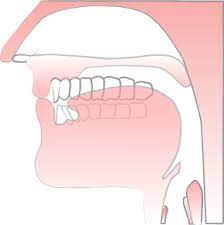
The variant [β] uses the same point of articulation as /b/. However, it requires only a partial obstruction between the upper and lower lips and the air never stops completely. It passes through this partial obstruction with friction, that is why this sound is called a fricative and it is softer than its occlusive counterpart. Whereas the sound /b/ is used at the beginning of a sentence or after “l,” “m,” or “n,” its variant [β] occurs in all other contexts, like between vowels. As the diagram below shows, in order to produce this sound the upper and lower lips must come very close to touching without actually doing so.
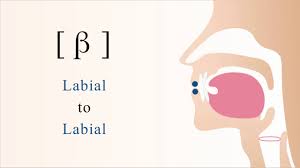
Now let us compare /b/ and [β]. Watch the animated diagrams below. The first three diagrams show the articulation of /b/ and the other three show [β].
/b/
BUQUE
VAGO
SOMBRA
[β]
LAVAR
ABRIGO
CURVA
Let’s practice! In the table below, on the left column you have words that contain the phoneme /b/ and in the right column there is a similar word containing the variant [β]. The difference between these two sounds can be very subtle so please listen carefully and repeat after the speaker.

ATTENTION: Remember that in Spanish the letter “v” is pronounced in exactly the same manner as the letter “b.”
| /b/ | [β] |
| banco | ábaco |
| banca | la banca* |
| bici | aviso |
| hombre | sobre |
| Beto | abeto |
| albo | nabo |
| vida | la vida* |
| vaca | abarca |
| vano | habano |
* In these examples the letter “b” and “v” appear at the beginning of the word. However, phonologically what matters is that the previous word “la” ends in a vowel, so “b” and “v” appear between vowels, therefore, the variant [β] is used.
III. /D/ AND ITS VARIANT [ð]
The phoneme /d/ is occlusive and it is represented by the letter “d.” In English /d/ is alveolar meaning that it is formed with the tongue touching the alveolar ridge. However, the Spanish /d/ is dental: its production requires a temporary obstruction produced when the tongue touches the back of the upper front teeth. In the diagram below, #3 and #4 show the Spanish and English /d/ respectively.
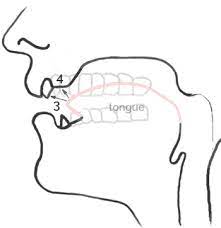
The phoneme /d/ has a variant: [ð], a fricative just like [β]. Its pronunciation is very similar to the voiced “th” in English like in “that.” Whereas /d/ occurs at the beginning of an utterance or after a pause, and after “l” or “n,” the variant [ð] occurs in all other contexts like between vowels or after consonants other than “l” or “n.” In order to articulate this sound, put your tongue in between the upper and lower teeth, just don’t bite it!
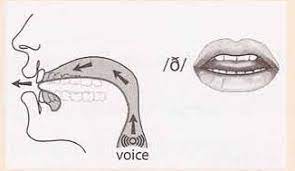
Before we compare /d/ and [ð], let us remember that the sound [ð] does exist in English, although it is represented graphically in a different way from Spanish. [ð] sounds like the “th” in “that.” Listen and repeat after the speakers.
| English th | [ð] |
| mother | moda |
| neither | nido |
| father | fado |
| soothing | suda |
| other | oda |
| brother | barda |
Now let us compare /d/ and [ð]. Watch the animated diagrams below. The first three diagrams show the articulation of /d/ and the other three show [ð].
/d/
DISCO
MUNDO
[ð]
CADA
CERDO
Let’s practice! In the table below, on the left column you have words that contain the phoneme /d/ and in the right column there is a similar word containing the variant [ð]. The difference between these two sounds can be very subtle so please listen carefully and repeat after the speaker.

ATTENTION: The fricative [ð] is a very dangerous sound for speakers of American English. If mispronounced, your accent can sound very foreign. Remember to pronounce it like a “th” as in “that.” NOT like in “Adam” or “bad or good.”
| /d/ | [ð] |
| dé | adeudo |
| depósito | adelanto |
| da | hada |
| dan | nadan |
| do | modo |
| Aldama | alada |
| mendigo | menudo |
| senda | seda |
| dolo | ídolo |
| celda | seda |
Before we go on to our next theme, let’s make sure that we are able to avoid mispronouncing the fricative [ð] as the tap /ɾ/. The left column in the table below shows words with a [ð] sound. The right column contains a similar word with the sound /ɾ/. Please listen carefully and then repeat.
| [ð] | /ɾ/ |
| estados | estaros |
| moneda | monera |
| todos | toros |
| modo | moro |
| dudo | duro |
| hablada | hablara |
| cada | cara |
| oda | ora |
| mido | miro |
| lodo | loro |
IV. /G/ AND ITS VARIANT [ɣ]
The phoneme /g/ is occlusive and it is represented by the letter “g” before “a,” “o,” and “u.” The sound /g/ is velar: its production requires a temporary obstruction created when the back of the tongue touches the roof of the oral cavity at the very back, as you can observe in the animation below:
The phoneme /g/ has a variant: [ɣ], a fricative sound. Its point of articulation is the same as /g/, but it requires only a partial obstruction. Whereas /g/ occurs at the beginning of a phrase or after “n,” the variant [ɣ] occurs in all other contexts like between vowels or after consonants other than “n.” The animation below shows the correct articulation of this sound.
The diagram below shows a comparison in the articulation points for /g/ and [ɣ].
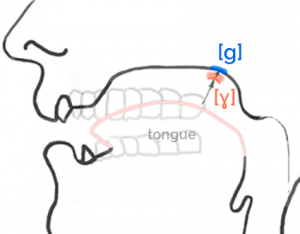
Let’s practice! In the table below, on the left column you have words that contain the phoneme /g/ and in the right column there is a similar word containing the variant [ɣ]. The difference between these two sounds can be very subtle so please listen carefully and repeat after the speaker.
| [g] | [ɣ] |
| gasto | mi gasto* |
| ganancia | la ganancia* |
| angosto | agosto |
| gato | lago |
| godo | dogo |
| sangrado | sagrado |
| mango | mago |
| gama | amaga |
| galo | hágalo |
* In these examples the “g” appears at the beginning of the word. However, phonologically what matters is that the previous words “mi” and “la” end in a vowel; therefore, the “g” appears between vowels and the variant [ɣ] is used.
Now we will mix up all six sounds studied in this section. Keep in mind all that you have learned so far. Remember that /b, d, g/ are occlusive consonants and that they require a temporary obstruction of the airflow. Conversely, the variants [β, ð, ɣ] require some friction, but no obstruction. Please listen to the speaker carefully and repeat focusing exclusively on these six sounds. For your convenience, the /b/, /d/, and /g/ are highlighted in black bold, whereas their variants [β], [ð], and [ɣ] in red bold.
— El sábado / estaba violentamente desganado
— Gracias a la vida / que había vivido.
— Además, Adán le dijo / que dejara de beber.
— Beber no es bueno / para Gabriel / dadas sus dolencias.
— Hoy domingo / vamos a ir / a verlo bastante temprano.
— Dudo que haga caso / de la recomendación de Adán.
Self Analysis Activity

Listen to your recording and answer the following questions. Answers will auto-save every 10 seconds.

